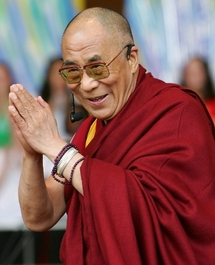
Hailing the Polish people's "desire for freedom", the Dalai Lama lit a candle at the foot of a vast black memorial wall inscribed with thousands of names of Polish resistance fighters killed in the Uprising launched August 1, 1944.
The rebellion, which lasted 63 days, saw 200,000 civilians and 18,000 resistance fighters massacred by the Nazis.
He also rang a bell decorating the memorial wall before hanging a large white scarf on it, a Buddhist symbol of purity and happiness.
"Very moving" he said following the visit. "I always admire the Polish people's spirit and also I think the desire for freedom," he said.
"Of course unfortunately one enemy gone and another enemy comes. (It's) seen very clearly in this museum," the Dalai Lama said referring to the fact that after Nazi Germany's defeat, Poland was ruled by a communist regime installed by the Soviet Union.
"Now you really got genuine freedom. Freedom gives rights. I think you have to realise with rights also there is duty and responsibility..." he said.
The Dalai Lama, 74, arrived in Warsaw Monday for a three-day visit. He lectured several hundred students Tuesday morning at Warsaw University and was expected to be named an honorary citizen of the Polish capital Wednesday morning.
Beijing accuses him of wanting full independence for Tibet, a claim which he himself has called "totally baseless", insisting instead on an autonomous status for his Himalayan homeland within China.
He has lived in exile in India since fleeing Tibet after a failed uprising in 1959 against Chinese rule.
---------------------------------------------------------------------------------------------------------------------------
The rebellion, which lasted 63 days, saw 200,000 civilians and 18,000 resistance fighters massacred by the Nazis.
He also rang a bell decorating the memorial wall before hanging a large white scarf on it, a Buddhist symbol of purity and happiness.
"Very moving" he said following the visit. "I always admire the Polish people's spirit and also I think the desire for freedom," he said.
"Of course unfortunately one enemy gone and another enemy comes. (It's) seen very clearly in this museum," the Dalai Lama said referring to the fact that after Nazi Germany's defeat, Poland was ruled by a communist regime installed by the Soviet Union.
"Now you really got genuine freedom. Freedom gives rights. I think you have to realise with rights also there is duty and responsibility..." he said.
The Dalai Lama, 74, arrived in Warsaw Monday for a three-day visit. He lectured several hundred students Tuesday morning at Warsaw University and was expected to be named an honorary citizen of the Polish capital Wednesday morning.
Beijing accuses him of wanting full independence for Tibet, a claim which he himself has called "totally baseless", insisting instead on an autonomous status for his Himalayan homeland within China.
He has lived in exile in India since fleeing Tibet after a failed uprising in 1959 against Chinese rule.
---------------------------------------------------------------------------------------------------------------------------









 Home
Home Politics
Politics









